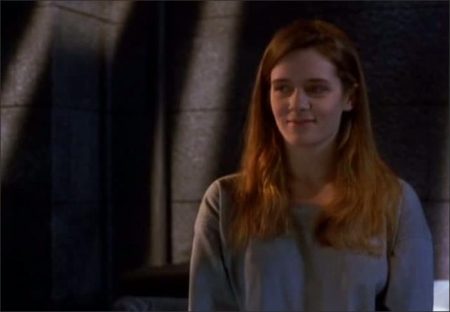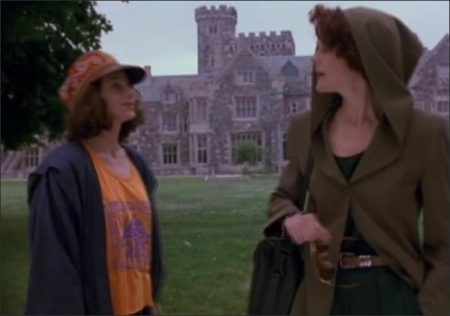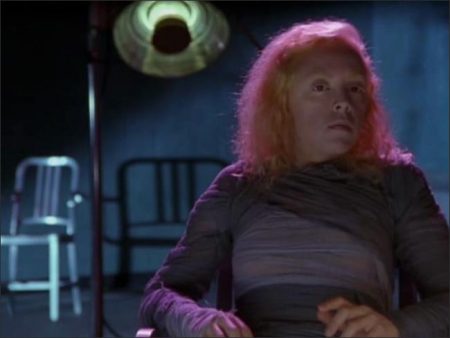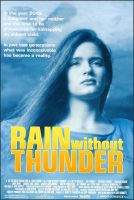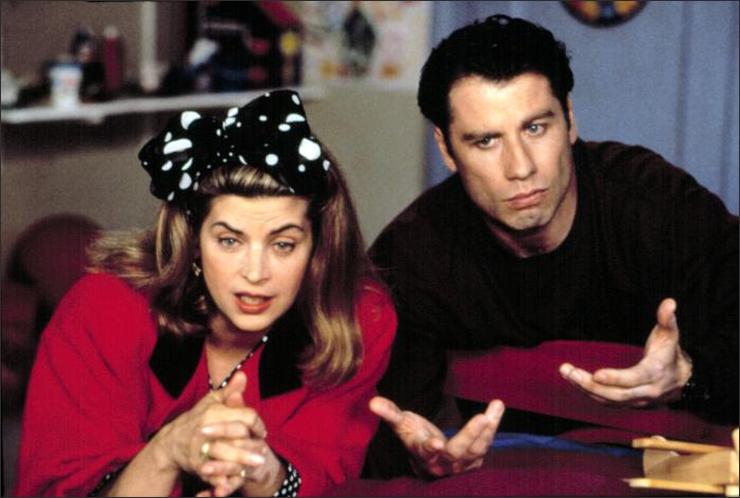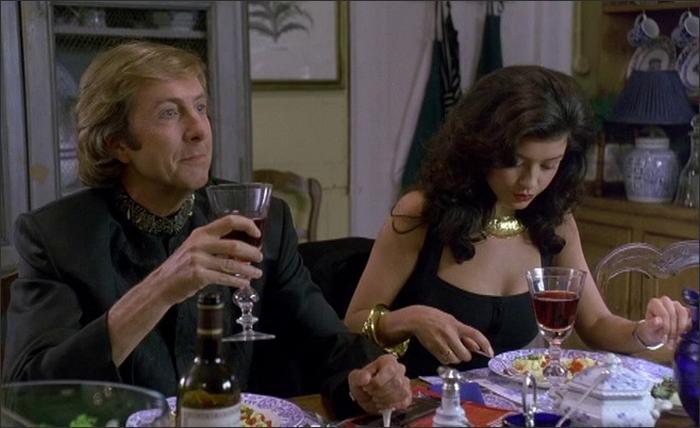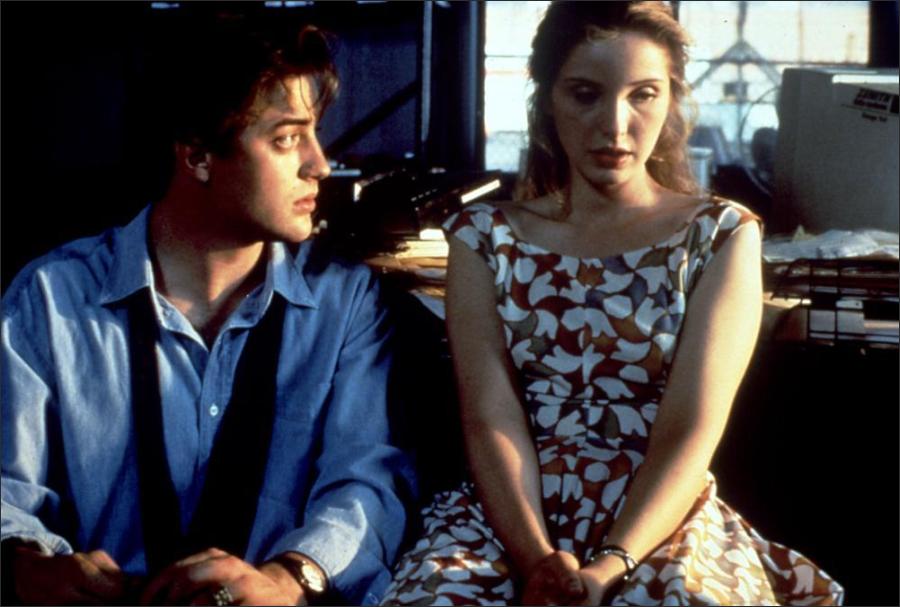Rain Without Thunder movie storyline. Allison Goldring, an upper-class, white college student, becomes pregnant with her boyfriend Jeremy Tanner (Steve Zahn). After discussing her options with both Tanner and her family, she makes the decision to travel abroad to terminate the pregnancy, as abortion is prosecuted as “fetal murder” in the United States.
According to Allison and her mother Beverley, everyone – including Tanner – supported her decision. Tanner later denies this, though the film makes his denial seem improbable. Allison’s father and grandmother are interviewed and openly support both Allison and Beverly. Allison’s father says that he originally intended to go along with them and that the choice to prosecute Beverly is arbitrary; ultimately, Beverly is perceived to have a greater influence on Allison.
Later interviews give further background on the society: civil liberties are slowly and methodically curtailed over time in order fight “hypercrime”. In the early twenty-first century, restrictions on warrants are loosened, and several states pass laws criminalizing abortion. At first, only abortionists are targeted by the laws, and complacent feminists dismiss the idea that the situation will get worse.
When the Roman Catholic Church accepts barrier contraception, feminism becomes further weakened, and a wave of pro-life legislation is passed, culminating in a new amendment to the United States Constitution that defines personhood at conception. Following that, laws are enacted that target women seeking abortions, and feminism becomes not only politically incorrect but also subject to historical revisionism that denies its impact.
Rain Without Thunder is a 1993 American science fiction film directed by Gary O. Bennett and starring Betty Buckley and Jeff Daniels. The film is set fifty years in the future from the time of production. Although the Planned Parenthood v. Casey case is not mentioned by name, the decision took place in the same year as the film was made and many characteristics of the society portrayed are clearly a reaction to the growing possibilities of restricting abortion rights at the time of production.
The film is presented as a documentary about the Goldring case, a mother and daughter imprisoned at the Walker Point Center for seeking an abortion outside of the United States. Although Beverly (Betty Buckley) and Allison (Ali Thomas) are the main focus, the journalist (Carolyn McCormick) also interviews numerous people with varying viewpoints discussing the ramifications of the Goldring case and abortion in general in 2042 society.
Film Review for Rain Without Thunder
“Rain Without Thunder” is the longest 85-minute movie I have ever seen. It slogs on, minute by dreary minute, through a lugubrious plot in which everything is made clear in the first five minutes and redundant in the next. I felt like I was watching a bad newscast in slow-motion.
The time is the year 2042. America looks much the same as today, except the men dress like “Star Trek” extras. Abortion has been made a major crime, and the penalties are draconian. The heroine (Ali Thomas) and her mother (Betty Buckley) have been convicted under the recently enacted Unborn Child Kidnapping Act, on charges of flying to Sweden to seek an abortion.
The movie intends to show us the frightening possibilities of anti-abortion legislation, and its pro-choice position is made clear by the photos of an aged Dan Quayle on the walls, and the naming of a women’s prison after George Bush’s second home, Walker’s Point. Given their way and following their logic, the movie argues, the anti-abortionists will eventually pass laws punishing abortion in the same way as kidnapping and murder.
Of course that would be perfectly logical. If abortion is murder, then it should be punished in the same way; women who have abortions should be executed or imprisoned for life, and abortionists should be tried as accomplices. The failure of anti-abortion groups to advocate the death penalty for abortionists and their clients shows either a lack of conviction about their central premise, or a lack of the nerve to follow it to its obvious conclusion.
None of which has anything to do with the experience of seeing “Rain Without Thunder,” which takes the form of a documentary – a very bad documentary – in which an endless parade of witnesses drones morosely into the camera, as an inquiring reporter tries to piece together the story. Some of the characters in the film are such bad actors that everything they say sounds as if it is being read, or recited by rote memory. Others, including talented actors such as Jeff Daniels, sound so lifeless one wonders if the director feared the energy of vernacular speech.
I am not ordinarily a fan of TV docudramas, but the moral dilemma of abortion has inspired several recent programs, any one of which had more energy (not to mention more sympathy for the audience) than this film. It might perhaps provide a starting point for discussion in a deadly earnest Politically Correct seminar, but as a moviegoing experience it ranks just above watching the “No Smoking” slides.
Rain Without Thunder (1993)
Directed by: Gary O. Bennett
Starring: Betty Buckley, Carolyn McCormick, Iona Morris, Steve Zahn, Jeff Daniels, Ali Thomas, Alyssa Rallo Bennett, Eliza Clark, Heather Lilly, Helen Lloyd Breed, Katy Selverstone
Screenplay by: Gary O. Bennett
Production Design by: Ina Mayhew
Cinematography by: Karl Kases
Film Editing by: Mallory Gottlieb, Suzanne Pillsbury
Costume Design by: Gail Bartley
Art Direction by: Llewellyn Harrison
Music by: Allen Lynch, Randall Lynch
Distributed by: Orion Classics
Release Date: February 5, 1993
Views: 187
